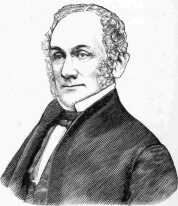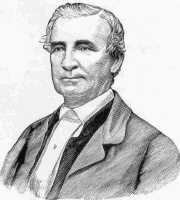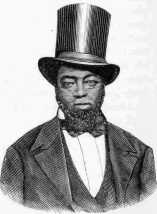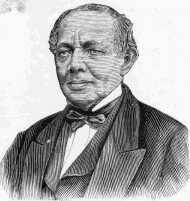The Underground Railroad
John Hunn
Was born in Charleston, S.C. on the 4th day of August, 1810. His father, William Purvis, was a native of Ross county, in Northumberland, England. His mother was a free-born woman, of Charleston. His maternal grandmother was a Moor; and her father was an Israelite, named Baron Judah. Robert Purvis and his two brothers were brought to the North by their parents in 1819. In Pennsylvania and New England he received his scholastic education, finishing it at Amherst College. Since that time his home has been in Philadelphia, or in the vicinity of that city.
His interest in the Anti-slavery cause began in his childhood, inspired by such books as “Sandford and Merton,” and Dr. Toney’s “Portraiture of Slavery,” which his father put into his hands. His father, though resident in a slave state, was never a slaveholder; but was heartily an Abolitionist in principle. It was Robert Purvis’ good fortune, before he attained his majority, to make the acquaintance of that earnest and self-sacrificing pioneer of freedom, Benjamin Lundy; and in conjunction with him, was an early laborer in the anti-slavery field. He was a member of the Convention held in Philadelphia in 1833, which formed the American Anti-slavery Society; and among the signatures to its Declaration of Sentiments, the name of Robert Purvis is to be seen; a record of which his posterity to the latest generation may be justly proud. During the whole period of that Society’s existence he was a member of it; and was also an active member and officer of The Pennsylvania Anti-slavery Society. To the cause of the slave’s freedom he gave with all his heart his money, his time, his talents. Fervent in soul, eloquent in speech, most gracious in manner, he was a favorite on the platform of Anti-slavery meetings. High-toned in moral nature, keenly sensitive in all matters pertaining to justice and integrity, he was a most valuable coadjutor with the leaders of an unpopular reform; and throughout the Anti-slavery conflict, he always received, as he always deserved, the highest confidence and warm personal regard of his fellow-laborers.
His faithful labors in aiding fugitive slaves cannot be recorded within the limits of this sketch. Throughout that long period of peril to all who dared to “remember those in bonds as bound with them,” his house was a well-known station on the Underground Rail Road; his horses and carriages, and his personal attendance, were ever at the service of the travelers upon that road. In those perilous duties his family heartily sympathized with him, and cheerfully performed their share.
He has lived to witness the triumph of the great cause to which he devoted his youth and his manhood; to join in the jubilee song of the American slave; and the thanksgiving of the Abolitionists; and to testify that the work of his life has been one “whose reward is in itself.”
* * * * *
THE CASE OF MOLLY, A SLAVE, BELONGING TO R—— B——, OF SMYRNA, DELAWARE.
BY JOHN HUNN, ENGINEER OF THE UNDERGROUND RAIL ROAD.
Molly escaped from her master’s farm, in Cecil county, Maryland, and found a place of refuge in the house of my cousin, John Alston, near Middletown, Delaware. The man-hunters, headed by a constable with a search warrant, took her thence and lodged her in New Castle Jail. This fact was duly published in the county papers, and her master went after his chattel, and having paid the expenses of her capture took immediate possession thereof.
She was hand-cuffed, and, her feet being tied together, she was placed in the wagon. Before she left the jail, the wife of the sheriff gave her a piece of bread and butter, which her master kicked out of her hand, and swore that bread and butter was too good for her. After this act her master took a drink of brandy and drove off.
He stopped at a tavern about four miles from New Castle and took another drink of brandy. He then proceeded to Odessa, then called Cantwell’s Bridge, and got his dinner and more brandy, for the day was a cold one. He had his horse fed, but gave no food to his human chattel, who remained in the wagon cold and hungry. After sufficient rest for himself and horse he started again. He was now twelve miles from home, on a good road, his horse was gentle, and he himself in a genial mood at the recovery of his bond-woman. He yielded to the influence of the liquor he had imbibed and fell into a sound sleep. Molly now determined to make another effort for her freedom. She accordingly worked herself gradually over the tail board of the wagon, and fell heavily upon the frozen ground. The horse and wagon passed on, and she rolled into the bushes, and waited for deliverance from her bonds. This came from a colored man who was passing that way. As he was neither a priest nor a Levite, he took the rope from her feet and guided her to a cabin near at hand, where she was kindly received. Her deliverer could not take the hand-cuffs off, but promised to bring a person, during the evening, who could perform that operation. He fulfilled his promise, and brought her that night to my house, which was in sight of the one whence she had been taken to New Castle Jail.
I had no fear for her safety, as I believed that her master would not think of looking for her so near to the place where she had been arrested. Molly remained with us nearly a month; but, seeing fugitives coming and going continually, she finally concluded to go further North. I wrote to my friend, Thomas Garrett, desiring him to get a good home for Molly. This he succeeded in doing, and a friend from Chester county, Pennsylvania, came to my house and took Molly with him. She remained in his family more than six months.
In the mean time the Fugitive Slave Law was passed by Congress, and several fugitives were arrested in Philadelphia and sent back to their masters. Molly, hearing of these doings, became uneasy, and finally determined to go to Canada. She arrived safely in the Queen’s Dominions, and felt at last that she had escaped from the hell of American Slavery.
Molly described her master as an indulgent one when sober, but when he was on a “spree” he seemed to take great delight in tormenting her. He would have her beaten unmercifully without cause, and then have her stripes washed in salt water, then he would have her dragged through the horse pond until she was nearly dead. This last operation seemed to afford him much pleasure. When he became sober he would express regret at having treated her so cruelly. I frequently saw this master of Molly’s, and was always treated respectfully by him. He would have his “sprees” after Molly left him.
* * * * *
AN ACCOUNT OF THE ESCAPE FROM SLAVERY OF SAMUEL HAWKINS AND FAMILY, OF QUEEN ANNE’S COUNTY, MARYLAND, ON THE UNDERGROUND RAIL ROAD, IN THE STATE OF DELAWARE.
BY JOHN HUNN.
On the morning of the 27th of 12th month (December), 1845, as I was washing my hands at the yard pump of my residence, near Middletown, New Castle county, Delaware, I looked down the lane, and saw a covered wagon slowly approaching my house. The sun had just risen, and was shining brightly (after a stormy night) on the snow which covered the ground to the depth of six inches. My house was situated three quarters of a mile from the road leading from Middletown to Odessa, (then called Cantwell’s Bridge.) On a closer inspection I noticed several men walking beside the wagon. This seemed rather an early hour for visitors, and I could not account for the circumstance. When they reached the yard fence I met them, and a colored man handed me a letter addressed to Daniel Corbit, John Alston or John Hunn; I asked the man if he had presented the letter to either of the others to whom it was addressed; he said, no, that he had not been able to see either of them. The letter was from my cousin, Ezekiel Jenkins, of Camden, Delaware, and stated that the travelers were fugitive slaves, under the direction of Samuel D. Burris (who handed me the note). The party consisted of a man and his wife, with their six children, and four fine-looking colored men, without counting the pilot, S.D. Burris, who was a free man, from Kent county, Delaware.
This was the first time that I ever saw Burris, and also the first time that I had ever been called upon to assist fugitives from the hell of American Slavery. The wanderers were gladly welcomed, and made as comfortable as possible until breakfast was ready for them. One man, in trying to pull his boots off, found they were frozen to his feet; he went to the pump and filled them with water, thus he was able to get them off in a few minutes.
This increase of thirteen in the family was a little embarrassing, but after breakfast they all retired to the barn to sleep on the hay, except the woman and four children, who remained in the house. They were all very weary, as they had traveled from Camden (twenty-seven miles), through a snowstorm; the woman and four children in the wagon with the driver, the others walking all the way. Most of them were badly frost-bitten, before they arrived at my house. In Camden, they were sheltered in the houses of their colored friends. Although this was my first acquaintance with S.D. Burris, it was not my last, as he afterwards piloted them himself, or was instrumental in directing hundreds of fugitives to me for shelter.
About two o’clock of the day on which these fugitives arrived at my house, a neighbor drove up with his daughter in a sleigh, apparently on a friendly visit. I noticed his restlessness and frequent looking out of the window fronting the road; but did not suppose, that he had come “to spy out the land.”
The wagon and the persons walking with it, had been observed from his house, and he had reported the fact in Middletown. Accordingly, in half an hour, another sleigh came up, containing a constable of Middletown, William Hardcastle, of Queen Ann’s county, Maryland, and William Chesnut, of the same neighborhood. I met them at the gate, and the constable handed me an advertisement, wherein one thousand dollars reward was offered for the recovery of three runaway slaves, therein described.
The constable asked me if they were in my house? I said they were not! He then asked me if he might search the house? I declined to allow him this privilege, unless he had a warrant for that purpose. While we stood thus conversing, the husband of the woman with the six children, came out of a house near the barn, and ran into the woods. The constable and his two companions immediately gave chase, with many halloos! After running more than a mile through the snow, the fugitive came toward the house; I went to meet him, and found him with his back against the barn-yard fence, with a butcher’s knife in his hand. The man hunters soon came up, and the constable asked me to get the knife from the fugitive. This I declined, unless the constable should first give me his pistol, with which he was threatening to shoot the man. He complied with my request, and the fugitive handed me the knife. Then he produced a pass, properly authenticated, and signed by a magistrate of Queen Ann’s county, Maryland, certifying that this man was free! and that his name was Samuel Hawkins.
William Hardcastle now advanced, and said that he knew the man to be free; but that he was accused of running away with his wife and children who were slaves. He also said, that this man had two boys with him, who belonged to a neighbor of his, named Charles Wesley Glanding, and that the four other children and mother belonged to Catharine Turner, of Queen Ann’s county, Maryland. Hardcastle further expressed his belief, that this man knew where his wife and children were at that time, and insisted that he should go before a magistrate in Middletown, and be examined in regard thereto. He also expressed doubts as to the genuineness of this pass, and wished the man to go to Middletown on that account also. As there was no other course to pursue under the circumstances, I had my sleigh brought out, and we all went to Middletown, before my friend, William Streets, who was then in commission as a magistrate. It was now after dark of this short winter’s day. Soon after our arrival at the office of William Streets, Hardcastle put his arm very lovingly around the neck of the colored man, Samuel Hawkins, and drew him into another room. In a short time, Samuel came out, and told me that Hardcastle had agreed, that if he, Hawkins, would give up his two older boys, who belonged to Charles Wesley Glanding; then he might pursue his journey with his wife and four children. I asked him if he believed Hardcastle would keep his promise? He replied: “Yes! I do not think master William would cheat me.” I assured him that he would cheat him, and that the offer was made for the purpose of not only getting the two older boys (fourteen and sixteen years of age), but his wife and other children to the office, when all of them would be taken together to the jail, in New Castle. Samuel thought differently, and at his request, I wrote to my wife for the delivery of the family of Samuel Hawkins to the constable. They were soon forthcoming, and on their arrival at the office, a commitment was made out for the whole party. Samuel and his two older sons were hand-cuffed, amidst many tears and lamentations, and they all went off under charge of the man-hunters, to New Castle jail, a distance of eighteen miles.
William Streets committed the whole party as fugitives from Slavery, while the husband (Samuel), was a free man. This was done on account of the detestation of the wicked business, as much as on account of his friendship for me.
On their arrival at the jail, about midnight, the sheriff was aroused, and the commitment shown to him; after reading it, he asked Samuel if he was a slave? He said no, and showed his pass (which had been pronounced genuine by the magistrate). The sheriff hereupon told them, that the commitment was not legal, and would not hold them lawfully. It was now first day (Sunday), and the man-hunters were in a quandary.
The constable finally agreed to go back and get another commitment, if the sheriff would take the party into the jail until his return; Hardcastle also urged the sheriff to adopt this plan. Accordingly they were taken into the jail.
The sheriff’s daughter had heard her father’s conversation with the constable, accordingly she sent word on First-day morning, to my revered friend, Thomas Garrett, of Wilmington, five miles distant, in regard to the matter, inviting him to see the fugitives. Early on Second day morning (Monday), Thomas went over with John Wales, attorney at law. The latter soon obtained a writ of habeas corpus from Judge Booth of New Castle, which was served upon the sheriff; who, therefore, brought the whole party before Judge Booth, who discharged them at once, as being illegally detained by the sheriff. Thomas Garrett, with the consent of the judge, then hired a carriage to take the woman and four children over to Wilmington, Samuel and the two older boys walked, so they all escaped from the man-hunters. They went from Wilmington to Byberry, and settled near the farm of Robert Purvis. Samuel Hawkins and wife have since died, but their descendants still live in that neighborhood, under the name of Hackett.
Soon after the departure of the fugitives from New Castle jail, the constable arrived with new commitments from William Streets, and presented them in due form to the sheriff; who informed him that they had been liberated by order of Judge Booth! A few hours after, William Hardcastle arrived from Philadelphia, expecting to take Samuel Hawkins and his family to Queen Ann’s county, Maryland. Judge of his disappointment at finding they were beyond his control—absolutely gone! They returned to Middletown in great anger, and threatened to prosecute William Streets for his participation in the affair.
After the departure of the Hawkins family from Middletown, I returned home to see what had become of S.D. Burris and his four men. I found them taking some solid refreshment, preparatory to taking a long walk in the snow. They left about nine P.M., for Wilmington. I sent by S.D. Burris a letter to Thomas Garrett, detailing the arrest and commitment of S. Hawkins and family to New Castle jail. They all arrived safely in Wilmington before daylight next morning. Burris waited to hear the result of the expedition to New Castle; and actually had the pleasure of seeing S. Hawkins and family arrive in Wilmington.
Samuel Burris returned to my house early on Third day morning, with a letter from Thomas Garrett, giving me a description of the whole transaction. My joy on this occasion was great! and I returned thanks to God for this wonderful escape of so many human beings from the charnel-house of Slavery.
OFFICERS OF THE ROAD.

JOHN HUNN
Chief Engineer of the Southern End. See p. 712.

SAMUEL RHOADS
STOCKHOLDER. See p. 719.

WILLIAM WHIPPER
CONDUCTOR AT COLUMBIA. See p. 735

SAMUEL D. BURRIS
CONDUCTOR. See p. 746
Of course this circumstance excited the ire of many pro-slavery editors in Maryland. I had copies of several papers sent me, wherein I was described as a man unfit to live in a civilized community, and calling upon the inhabitants of Middletown to expel such a dangerous person from that neighborhood! They also told exactly where I lived, which enabled many a poor fugitive escaping from the house of bondage, to find a hearty welcome and a resting-place on the road to liberty. Thanks be to God! for His goodness to me in this respect.
The trial which ensued from the above, came off before Chief Justice Taney, at New Castle. My revered friend, Thomas Garrett, and myself, were there convicted of harboring fugitive slaves, and were fined accordingly, to the extent of the law; Judge Taney delivering the sentence. A detailed account of said trial, will fully appear in the memoirs of our deceased friend, Thomas Garrett.

